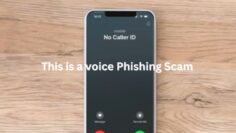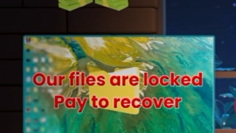Stay Alert: The fake prize Scam
fake prize Scam Scammers are always looking for new ways to trick people into sharing their personal or financial information, and one of their most common tactics is the fake lottery or prize scam.
In this scenario, Omar receives a text message informing him that he has won a cash prize, but before claiming In this scenario.
How These Scams Work:
🔹 Unexpected Prize Notifications – The scam starts with an email, text message, or phone call claiming that you’ve won a lottery, sweepstakes, or contest you don’t remember entering.
🔹 Urgency & Pressure to Act Fast – Scammers often use phrases like “Act now before your prize expires!” to push victims into making hasty decisions without thinking.
🔹 Request for Personal or Financial Information – They may ask for bank details, ID numbers, or other sensitive information, claiming it’s needed to process the prize. Some even ask for a “processing fee” or taxes to be paid in advance.
🔹 Fake Links and Malware – Clicking on the links provided in these messages can lead to phishing websites that steal your credentials or install malware on your device.
Stay Vigilant Against Impersonation Calls
Red Flags: How to Identify a Fake Lottery Scam
✅ Did you actually enter a contest or lottery? If not, then you can’t win one.
✅ Are they asking for personal or banking information? Legitimate companies never request sensitive details over email or text.
✅ Do they demand a “processing fee” or tax payment upfront? Real lotteries deduct any applicable fees from your winnings, they don’t ask you to pay anything in advance.
✅ Is the message poorly written or from an unofficial source? Scammers often use generic greetings like “Dear Winner” instead of your actual name.
✅ Are they rushing you? Scammers don’t want you to verify their claims; they want you to act immediately without thinking.
What Should You Do If You Receive a Suspicious Message?
🚫 Ignore and delete the message – If you didn’t enter, there’s no prize.
🚫 Do not click on any links or attachments – They may contain malware or lead to phishing sites.
🚫 Never share personal or financial information – Scammers can use your data for identity theft.
🚫 Verify with official sources – If the message claims to be from a well-known company, check their official website or customer service before taking any action.
“If it sounds too good to be true, it probably is.” Scammers rely on curiosity, excitement, and urgency to trick victims. Always stop and think before responding, and when in doubt—delete the message and move on. Stay safe and protect your personal information.
Scammers are always looking for new ways to trick people into sharing their personal or financial information, and one of their most common tactics is the fake lottery or prize scam. In this scenario, Omar receives a text message informing him that he has won a cash prize, but before claiming it, he must provide his details. Although the message looks legitimate and exciting, Adam and Sarah quickly step in to warn him—this is nothing more than a scam designed to steal personal data.
How These Scams Work:
🔹 Unexpected Prize Notifications – The scam starts with an email, text message, or phone call claiming that you’ve won a lottery, sweepstakes, or contest you don’t remember entering.
🔹 Urgency & Pressure to Act Fast – Scammers often use phrases like “Act now before your prize expires!” to push victims into making hasty decisions without thinking.
🔹 Request for Personal or Financial Information – They may ask for bank details, ID numbers, or other sensitive information, claiming it’s needed to process the prize. Some even ask for a “processing fee” or taxes to be paid in advance.
🔹 Fake Links and Malware – Clicking on the links provided in these messages can lead to phishing websites that steal your credentials or install malware on your device.
Red Flags: How to Identify a Fake Lottery Scam
✅ Did you actually enter a contest or lottery? If not, then you can’t win one.
✅ Are they asking for personal or banking information? Legitimate companies never request sensitive details over email or text.
✅ Do they demand a “processing fee” or tax payment upfront? Real lotteries deduct any applicable fees from your winnings, they don’t ask you to pay anything in advance.
✅ Is the message poorly written or from an unofficial source? Scammers often use generic greetings like “Dear Winner” instead of your actual name.
✅ Are they rushing you? Scammers don’t want you to verify their claims; they want you to act immediately without thinking.
What Should You Do If You fake prize Scam:?
🚫 Ignore and delete the message – If you didn’t enter, there’s no prize.
🚫 Do not click on any links or attachments – They may contain malware or lead to phishing sites.
🚫 Never share personal or financial information – Scammers can use your data for identity theft.
🚫 Verify with official sources – If the message claims to be from a well-known company, check their official website or customer service before taking any action.
Final Reminder:
“If it sounds too good to be true, it probably is.” Scammers rely on curiosity, excitement, and urgency to trick victims. Always stop and think before responding, and when in doubt—delete the message and move on. Stay safe and protect your personal information.


.png)























